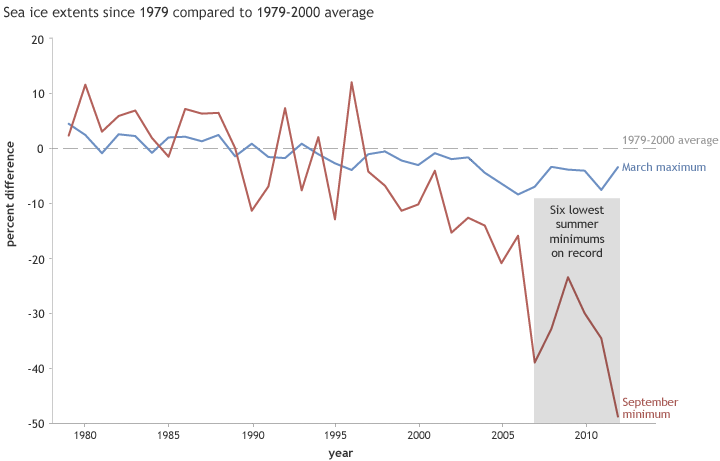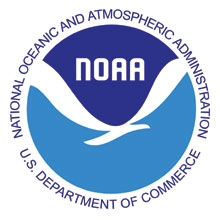State of the Climate 2012 – Arctic Sea Ice
Highlights:
-
In 2012, summer minimum sea ice extent was recorded at 3.41 million square kilometers: the lowest of the satellite era.
-
Overall, since satellite-based measurements began in the late 1970s, Arctic sea ice extent has decreased in all months and virtually all regions, with the exception of the Bering Sea during winter.
Why it matters
Sea ice extent in the Arctic plays a critical role in the Earth system. Physically, its white surface reflects up to 80 percent of incoming sunlight during the long days of Northern Hemisphere summer, exerting a cooling influence on the climate. Plus, polar bears, walruses, and whales rely on the presence of sea ice to preserve their hunting, breeding, and migrating habits. Additionally, less ice means more Arctic shipping and exploration, with major implications for the world economy and national security.
Conditions in 2012
In 2012, summer minimum sea ice extent was recorded at 3.41 million square kilometers: the lowest of the satellite era, and 18 percent lower than in 2007, when the previous record of 4.17 million square kilometers was recorded.
 Map shows ice concentration on September 16, along with the extent of the previous record low (yellow line) and the mid-September median extent (black line).
Map shows ice concentration on September 16, along with the extent of the previous record low (yellow line) and the mid-September median extent (black line).
Change Over Time
Fonte: NOAA
EcoDebate, 19/08/2013
 [ O conteúdo do EcoDebate pode ser copiado, reproduzido e/ou distribuído, desde que seja dado crédito ao autor, ao EcoDebate e, se for o caso, à fonte primária da informação ]
[ O conteúdo do EcoDebate pode ser copiado, reproduzido e/ou distribuído, desde que seja dado crédito ao autor, ao EcoDebate e, se for o caso, à fonte primária da informação ]
Inclusão na lista de distribuição do Boletim Diário do Portal EcoDebate
Caso queira ser incluído(a) na lista de distribuição de nosso boletim diário, basta clicar no LINK e preencher o formulário de inscrição. O seu e-mail será incluído e você receberá uma mensagem solicitando que confirme a inscrição.
O EcoDebate não pratica SPAM e a exigência de confirmação do e-mail de origem visa evitar que seu e-mail seja incluído indevidamente por terceiros.
Remoção da lista de distribuição do Boletim Diário do Portal EcoDebate
Para cancelar a sua inscrição neste grupo, envie um e-mail para ecodebate@ecodebate.com.br. O seu e-mail será removido e você receberá uma mensagem confirmando a remoção. Observe que a remoção é automática mas não é instantânea.

